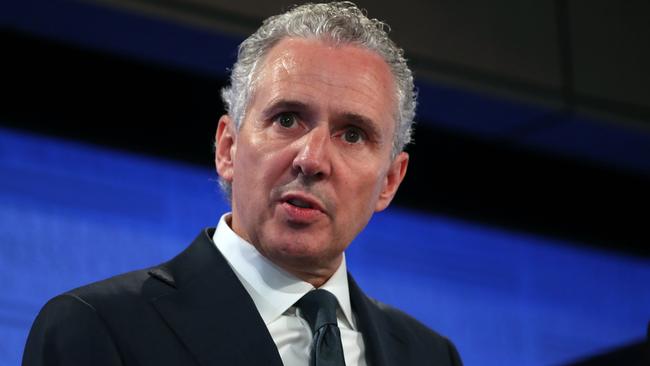Telstra chief Andy Penn in supplier pay backflip
Telstra has caved to growing community anger with a decision to move most suppliers to 20-day payment terms.

Telstra is moving the majority of its suppliers to 20-day payment terms in the face of mounting community anger and after the telco risked losing hundreds of millions of dollars in government contracts if it didn’t pay its suppliers promptly.
Company chief executive Andrew Penn announced late on Tuesday afternoon it would slash its payment terms from 62 to 20 days for 85 per cent of its suppliers. The rest will negotiate terms directly with the telco, which has been battling declining earnings.
The humiliating backflip comes less than a year after Telstra extended its payment terms from 45 to 62 days and unleashed a payday lending scheme on suppliers who wanted to be paid earlier, which it ditched last Thursday.
The Australian revealed last week that Telstra had partnered with financial technology firm Taulia — a company based in the low tax state of Delaware — to create the payday lending scheme, which involved suppliers taking a haircut on the invoices in exchange for prompt payment.
Furthermore, The Australian revealed that Taulia used big data and artificial intelligence to calculate a supplier’s willingness to discount its invoices and how much of a financial hit they could take — and Telstra was exploiting a loophole in the BCA’s supplier code to avoid paying small businesses on time.
The move attracted strong criticism from the federal government, Small Business Ombudsman Kate Carnell and Shadow Employment and Industry Minister Brendan O’Connor, while the Australian Competition and Consumer Commission was understood to be investigating the telco’s conduct.
Mr Penn said under the new terms suppliers with invoices of up to $2m annually will receive payment within 20 days.
“I recognise how important cash flow is to businesses, particularly given the challenges the bushfires have presented, and this change will mean small and medium businesses across the country have cash in their hands sooner,” Mr Penn said.
“We are confident this change will mean our approach goes well beyond any existing definition of small business, including companies with less than 20 employees and also $10m of annual turnover.”
Telstra has been battling declining earnings and last year posted a 40 per cent drop in full-year net profit. The telco is also in the middle of a strategic makeover aimed at cutting billions of dollars off its books.
The company’s 2018-2019 annual report showed that the use of supply-chain financing had allowed the company to shift $591m worth of unpaid bills from the “trade payables” line item in its financial statements to “other payables” — $551m more than in the previous fiscal year.
Telstra had maintained its smaller suppliers were still being paid within 30 days, in line with its commitments to the Business Council of Australia’s voluntary Australian Supplier Payment Code. But it ditched its supply chain financing scheme in the aftermath of a series of questions from The Australian.
The Australian was preparing to publish a report that revealed Telstra had been exploiting a loophole in a voluntary code of conduct to avoid paying small companies on time.
The BCA scrapped its definition of a small business last year after a review from former Australian Competition & Consumer Commission chair Graeme Samuel. But the changes only applied to new signatories, with companies such as Telstra, which signed up in 2017, allowed to adhere to the old conditions. This meant Telstra still defined a small business as one employing fewer than 20 staff.
Mr Penn called for governments and the Small Business Ombudsman to work with the business community to create a standard, consistent definition for small businesses.
“When Telstra led the charge in 2017 to ensure small businesses were paid within 30 days, we adopted the Australian Bureau of Statistics’ definition,” Mr Penn said.
“Since then, different businesses, regulators and other organisations have adopted other definitions. Having a unified approach across the economy would be more efficient and we would be happy to ensure our practices meet or exceed this.”
Since launching the payday lending scheme across its smaller and medium-sized suppliers at the start of last year, Telstra has won 467 contracts with the federal government departments, worth $316.7m.
Those contracts risked being torn up after the federal government announced on Friday it was moving to legislate to ensure companies that dealt with the government paid its suppliers in line with the government’s own 20-day policy.
The government plans to introduce the separate Payment Times Reporting Framework legislation this autumn. Once implemented, the scheme will require Australian businesses with an annual turnover of $100m or more to report how and when they pay their small
business suppliers.
“This will be a landmark reform which will encourage fairer and faster payment times for small businesses,” Small Business Minister Michaelia Cash said.


